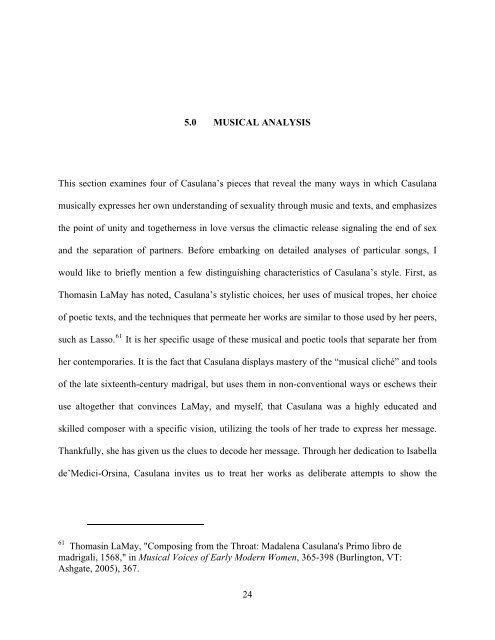Download - D-Scholarship@Pitt - University of Pittsburgh
Download - D-Scholarship@Pitt - University of Pittsburgh
Download - D-Scholarship@Pitt - University of Pittsburgh
Create successful ePaper yourself
Turn your PDF publications into a flip-book with our unique Google optimized e-Paper software.
5.0 MUSICAL ANALYSIS<br />
This section examines four <strong>of</strong> Casulana’s pieces that reveal the many ways in which Casulana<br />
musically expresses her own understanding <strong>of</strong> sexuality through music and texts, and emphasizes<br />
the point <strong>of</strong> unity and togetherness in love versus the climactic release signaling the end <strong>of</strong> sex<br />
and the separation <strong>of</strong> partners. Before embarking on detailed analyses <strong>of</strong> particular songs, I<br />
would like to briefly mention a few distinguishing characteristics <strong>of</strong> Casulana’s style. First, as<br />
Thomasin LaMay has noted, Casulana’s stylistic choices, her uses <strong>of</strong> musical tropes, her choice<br />
<strong>of</strong> poetic texts, and the techniques that permeate her works are similar to those used by her peers,<br />
such as Lasso. 61 It is her specific usage <strong>of</strong> these musical and poetic tools that separate her from<br />
her contemporaries. It is the fact that Casulana displays mastery <strong>of</strong> the “musical cliché” and tools<br />
<strong>of</strong> the late sixteenth-century madrigal, but uses them in non-conventional ways or eschews their<br />
use altogether that convinces LaMay, and myself, that Casulana was a highly educated and<br />
skilled composer with a specific vision, utilizing the tools <strong>of</strong> her trade to express her message.<br />
Thankfully, she has given us the clues to decode her message. Through her dedication to Isabella<br />
de’Medici-Orsina, Casulana invites us to treat her works as deliberate attempts to show the<br />
61 Thomasin LaMay, "Composing from the Throat: Madalena Casulana's Primo libro de<br />
madrigali, 1568," in Musical Voices <strong>of</strong> Early Modern Women, 365-398 (Burlington, VT:<br />
Ashgate, 2005), 367.<br />
24















